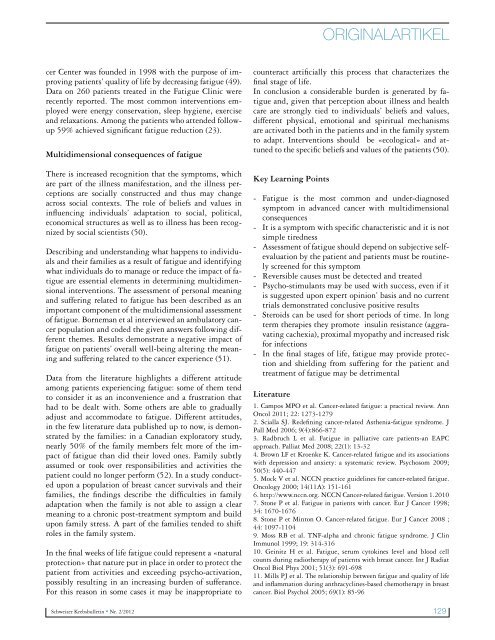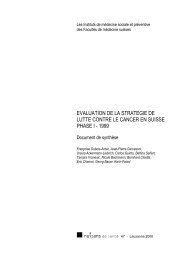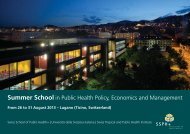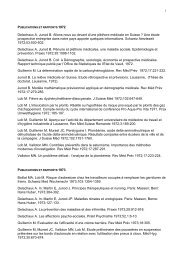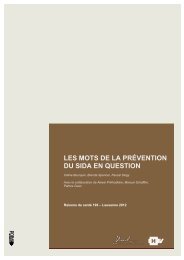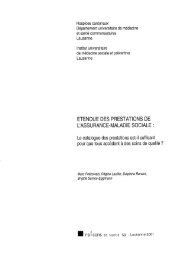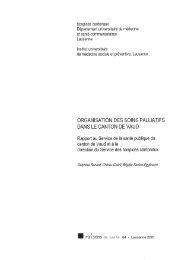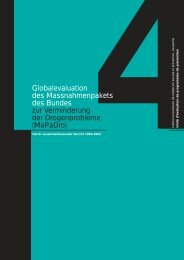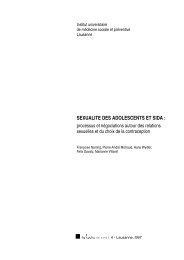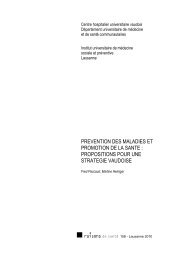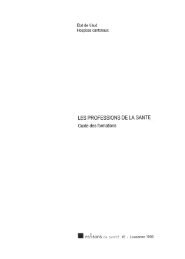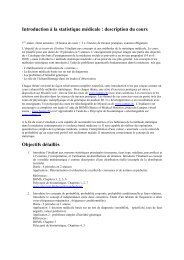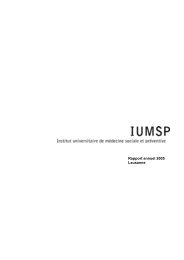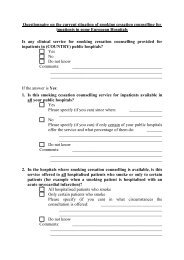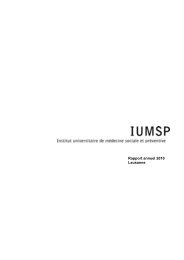Fortbildungen / Formations continues 2012 - IUMSP
Fortbildungen / Formations continues 2012 - IUMSP
Fortbildungen / Formations continues 2012 - IUMSP
Erfolgreiche ePaper selbst erstellen
Machen Sie aus Ihren PDF Publikationen ein blätterbares Flipbook mit unserer einzigartigen Google optimierten e-Paper Software.
cer Center was founded in 1998 with the purpose of improving<br />
patients’ quality of life by decreasing fatigue (49).<br />
Data on 260 patients treated in the Fatigue Clinic were<br />
recently reported. The most common interventions employed<br />
were energy conservation, sleep hygiene, exercise<br />
and relaxations. Among the patients who attended followup<br />
59% achieved signi�cant fatigue reduction (23).<br />
Multidimensional consequences of fatigue<br />
There is increased recognition that the symptoms, which<br />
are part of the illness manifestation, and the illness perceptions<br />
are socially constructed and thus may change<br />
across social contexts. The role of beliefs and values in<br />
influencing individuals’ adaptation to social, political,<br />
economical structures as well as to illness has been recognized<br />
by social scientists (50).<br />
Describing and understanding what happens to individuals<br />
and their families as a result of fatigue and identifying<br />
what individuals do to manage or reduce the impact of fatigue<br />
are essential elements in determining multidimensional<br />
interventions. The assessment of personal meaning<br />
and suffering related to fatigue has been described as an<br />
important component of the multidimensional assessment<br />
of fatigue. Borneman et al interviewed an ambulatory cancer<br />
population and coded the given answers following different<br />
themes. Results demonstrate a negative impact of<br />
fatigue on patients’ overall well-being altering the meaning<br />
and suffering related to the cancer experience (51).<br />
Data from the literature highlights a different attitude<br />
among patients experiencing fatigue: some of them tend<br />
to consider it as an inconvenience and a frustration that<br />
had to be dealt with. Some others are able to gradually<br />
adjust and accommodate to fatigue. Different attitudes,<br />
in the few literature data published up to now, is demonstrated<br />
by the families: in a Canadian exploratory study,<br />
nearly 50% of the family members felt more of the impact<br />
of fatigue than did their loved ones. Family subtly<br />
assumed or took over responsibilities and activities the<br />
patient could no longer perform (52). In a study conducted<br />
upon a population of breast cancer survivals and their<br />
families, the �ndings describe the dif�culties in family<br />
adaptation when the family is not able to assign a clear<br />
meaning to a chronic post-treatment symptom and build<br />
upon family stress. A part of the families tended to shift<br />
roles in the family system.<br />
In the �nal weeks of life fatigue could represent a «natural<br />
protection» that nature put in place in order to protect the<br />
patient from activities and exceeding psycho-activation,<br />
possibly resulting in an increasing burden of sufferance.<br />
For this reason in some cases it may be inappropriate to<br />
counteract arti�cially this process that characterizes the<br />
�nal stage of life.<br />
In conclusion a considerable burden is generated by fatigue<br />
and, given that perception about illness and health<br />
care are strongly tied to individuals’ beliefs and values,<br />
different physical, emotional and spiritual mechanisms<br />
are activated both in the patients and in the family system<br />
to adapt. Interventions should be «ecological» and attuned<br />
to the specific beliefs and values of the patients (50).<br />
Key Learning Points<br />
ORIGINALARTIKEL<br />
- Fatigue is the most common and under-diagnosed<br />
symptom in advanced cancer with multidimensional<br />
consequences<br />
- It is a symptom with speci�c characteristic and it is not<br />
simple tiredness<br />
- Assessment of fatigue should depend on subjective selfevaluation<br />
by the patient and patients must be routinely<br />
screened for this symptom<br />
- Reversible causes must be detected and treated<br />
- Psycho-stimulants may be used with success, even if it<br />
is suggested upon expert opinion’ basis and no current<br />
trials demonstrated conclusive positive results<br />
- Steroids can be used for short periods of time. In long<br />
term therapies they promote insulin resistance (aggravating<br />
cachexia), proximal myopathy and increased risk<br />
for infections<br />
- In the final stages of life, fatigue may provide protection<br />
and shielding from suffering for the patient and<br />
treatment of fatigue may be detrimental<br />
Literature<br />
1. Campos MPO et al. Cancer-related fatigue: a practical review. Ann<br />
Oncol 2011; 22: 1273-1279<br />
2. Scialla SJ. Rede�ning cancer-related Asthenia-fatigue syndrome. J<br />
Pall Med 2006; 9(4):866-872<br />
3. Radbruch L et al. Fatigue in palliative care patients-an EAPC<br />
approach. Palliat Med 2008; 22(1): 13-32<br />
4. Brown LF et Kroenke K. Cancer-related fatigue and its associations<br />
with depression and anxiety: a systematic review. Psychosom 2009;<br />
50(5): 440-447<br />
5. Mock V et al. NCCN practice guidelines for cancer-related fatigue.<br />
Oncology 2000; 14(11A): 151-161<br />
6. http://www.nccn.org. NCCN Cancer-related fatigue. Version 1.2010<br />
7. Stone P et al. Fatigue in patients with cancer. Eur J Cancer 1998;<br />
34: 1670-1676<br />
8. Stone P et Minton O. Cancer-related fatigue. Eur J Cancer 2008 ;<br />
44: 1097-1104<br />
9. Moss RB et al. TNF-alpha and chronic fatigue syndrome. J Clin<br />
Immunol 1999; 19: 314-316<br />
10. Geinitz H et al. Fatigue, serum cytokines level and blood cell<br />
counts during radiotherapy of patients with breast cancer. Int J Radiat<br />
Oncol Biol Phys 2001; 51(3): 691-698<br />
11. Mills PJ et al. The relationship between fatigue and quality of life<br />
and in�ammation during anthracyclines-based chemotherapy in breast<br />
cancer. Biol Psychol 2005; 69(1): 85-96<br />
Schweizer Krebsbulletin � Nr. 2/<strong>2012</strong> 129


